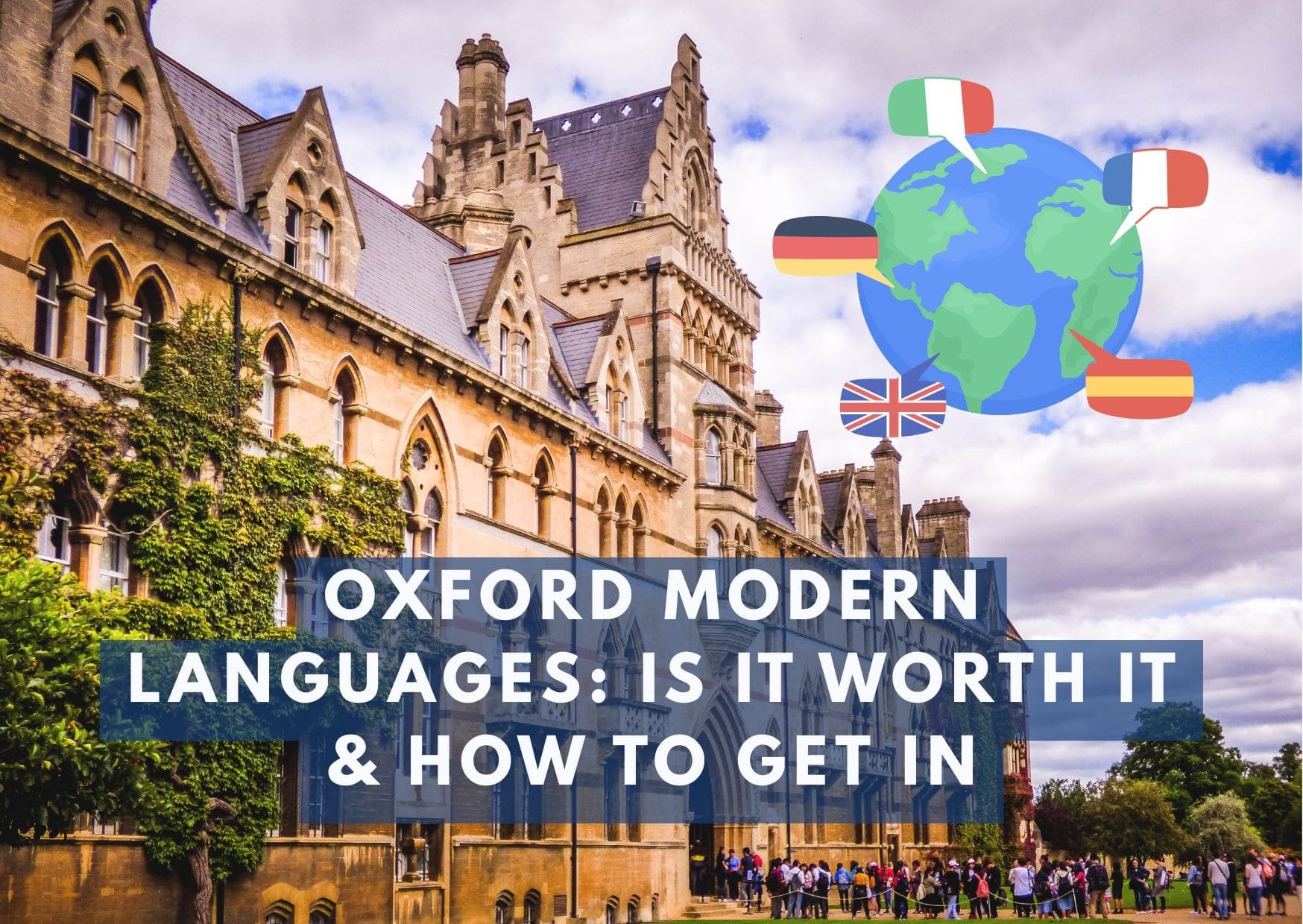Oxford Modern Languages: Is It Worth It & How to Get In
Blog Contents
What Languages Can You Study at Oxford? What should you expect from the Modern Languages course?
Oxford Modern Languages Admissions Requirements and Acceptance Rate
How to Write a Personal Statement for Oxford Modern Languages
Modern Languages Admissions Test (MLAT) and Sample Questions
Oxford Modern Languages Interview Insights and Practice Tips
Is Modern Languages at Oxford Worth It?
Modern Languages is an exciting course where students hone their writing and speaking abilities in a chosen language or languages and explore the literature and thought of these languages.
Students will enhance their language abilities, leading to fluency, by learning the intricacies of how language works: specific words and grammar, the impact of translation, appreciating different communication styles, and more.
Literature studies can be focused on any period from medieval times to now. Studying literature gives you a better appreciation of culture than learning the language alone, involving cross-disciplinary study in history, gender studies, anthropology, philosophy, politics, and more.
Employability, Careers, and Further Study Options
Students go on to do various things, whether teaching, journalism, law, or civil and diplomatic services.
Language graduates are great communicators, critical thinkers, and empathisers.
They develop a range of desirable transferable skills such as analysis, argumentation, and appreciating different perspectives, on top of working competencies in one or more languages.
Contrary to what you may assume, Modern languages are consistently one of the most employable degrees, sought out by employers.
How does Oxford compare to other Modern Languages Courses in the UK?
It’s been taught at Oxford since 1724, far longer than many UK universities have even existed!
It has the biggest languages faculty in the country, taking in more than 250 students a year, including joint schools.
The Guardian UK Universities League table for Modern Languages places Oxford second in the country, behind only St Andrews for 2025. By comparison, Cambridge is 5th.
The Complete University Guide and the QS World Rankings place Cambridge 1st and Oxford 2nd.
Whilst Cambridge also allows students to explore many non-European languages and cultures, Oxford has a narrower focus on European Languages, which it excels at teaching.
So, yes, it’s definitely worth it!
Provided you have a passion for languages, you want to enhance your abilities and learn more about the culture and literature of a respective language. All of this occurs under the guidance of first-rate teachers and instils values in you that employers look for.
If you aren’t sure the course or the university is right for you, our tutors can offer mentoring to help you determine the place and path of study for you. We have years of experience assisting students in finding the place where they’d feel at home and be able to perform to the best of their abilities.
Learn more about how our university application mentoring works here
What Languages Can You Study at Oxford? What should you expect from the Modern Languages course?
Languages Available
Students can choose either one language on its own or two languages together.
One of these two languages can be learned from scratch.
French and Spanish cannot be learned from scratch.
Students cannot study two beginner’s languages or a language from scratch on its own.
The Following languages are available:
Czech (with Slovak)
French
German
Modern Greek
Italian
Polish
Portuguese
Russian
Spanish
The languages, language combinations, and other subjects vary per college. To find out where you can study your chosen combination, see this page.
Joint Courses
Students can opt for a language and another subject. There are various options for this.
Classics and Modern Languages
English and Modern Languages
European and Middle Eastern Languages
History and Modern Languages
Modern Languages and Linguistics
Philosophy and Modern Languages
Course Structure and Format
Modern Languages is a 4-year course with the third year abroad, either studying, working, or combining the two.
You must spend at least 24 weeks in an immersive target language environment.
It’s entirely up to you what you do and how you split your time between different countries, but also roles, for instance, a mix of working and studying.
Many people choose to teach as a language assistant, others to find internships, or work at embassies. There’s so much out there.
Courses with beginners Russian or a Middle Eastern language have their year abroad in the second year.
Teaching occurs via tutorials, classes, and lectures.
Tutorials are sessions with your tutor, an expert in their field, yourself and possibly another student or two.
These sessions involve discussion and debate around a piece of work you have produced.
They can be intense and somewhat challenging, but they are very personal and a fantastic learning opportunity.
The first year is very prescribed.
There are oral, grammar, and translation classes for your language(s).
There are also a few hours of lectures, seminars, and tutorials on literature.
The split is about 50-50.
Students studying a single language do both of these elements, but also have further options such as film studies, medieval studies, and other options depending on their language.
Second and fourth year
There are still both language and literature requirements, but students have more control over choosing a period of literature.
There are also optional subjects such as historical and contemporary linguistics, detailed study of individual authors, visual cultures, new ecologies and much more.
In the 4th year, students take an optional dissertation.
Examination formats:
At the end of the first year, students take preliminary examinations to pass to the second year. These results don’t impact their final degree certification.
At the end of the fourth year, final university examinations are a mix of written papers, coursework, and oral exams.
Hidden Gems: Oxford’s Modern Languages Faculty and Libraries
Oxford Language students benefit from the Taylor Institution Library. This research library is the biggest in Britain and is solely for modern languages.
There is also a separate Modern Languages faculty library, and each college has its own library.
Oxford also has its own Language Centre, which has revolutionised the study of modern languages for students.
Again, to learn if Oxford is the place for you and the right modern languages course for your interests, consider mentoring with our Oxford graduate languages tutors. They’ve got first-hand experience to divulge the ins and outs and reality of studying languages at Oxford.
Oxford Modern Languages Admissions Requirements and Acceptance Rate
The typical offer is AAA.
One or more languages are required at A-Level, depending on the course chosen.
If a candidate has studied the language before, they must have an A-Level or equivalent.
If they aren’t taking the language as one of their qualifications, they need to attain proficiency at level B1 of CERF.
Those applying for a beginner’s language course mean no prior knowledge of the language is expected.
The average acceptance rate from 2022-2024 was 42%. 94% of applicants were interviewed. The intake is 144 a year.
How to Write a Personal Statement for Oxford Modern Languages
Show a demonstrable passion for languages. If you’ve got a niche language interest, that’s great to mention!
Don’t just state the extra-curricular language exploration you’ve done. You need to say what you thought of that French film you watched or that classic Italian literature you read.
Written work is no longer required for 2026 entry. This means it is even more likely that your personal statement content will be brought up at the interview. So make sure you know it!
For further guidance on specific personal statements, check out these resources:
For what to include in a language or linguistic personal statement, such as great books to get your extra-curricular exploration started, check out this article on Applying for Linguistics at University, written by Rhys, who studied Linguistics and Spanish at Oxford.
French at University: French Personal Statement Tips and More
Preparing for German at University? Written by an Oxford graduate.
Based on your interests, our Oxford modern languages tutors can help cultivate reading lists and further exploration activities and resources bespoke to you.
They’ve all crafted personal statements that have got them into the modern languages course.
We will match you with a tutor who’s taken the same or a very similar language, a combination of languages, or a language and subject.
We provide both drafting and refinement help.
If it’s extra-curricular activities you’re looking for to boost your personal statement even further, consider our Minds Underground beyond the curriculum offerings. We offer:
All of these opportunities enable students to understand better what learning a language at university involves, leave them with skills, such as critical analysis, that Oxbridge values, and provide them with stand-out content for their personal statements and interviews.
To enquire more about our personal statement help or extra-curricular offerings, book a free 20-minute consultation.
Modern Languages Admissions Test (MLAT) and Sample Questions
What is the MLAT?
The Modern Languages Admissions Test (MLAT) is typically taken at the end of October of the year before entry. For this year’s date, see here.
Registration and booking occur between June and September.
Learn more about registering and booking here.
It is computer-based.
You take a section for the language or languages you are applying for:
This consists of 20 multiple-choice questions and 10 English-translation questions.
The multiple-choice questions involve a sentence with a gap, and you need to choose the correct option that fills the gap.
The translation is from the target language into English.
There are eight language-specific sections. These tables reveal which you need to sit for the degree you’re applying to.
This is only taken in languages you’ve studied at sixth form or college, not ones you’re applying to that you’re a beginner at.
Those applying for just Russian, Russian as a beginner, or courses with Polish must also take the Language Aptitude Test (LAT).
This consists of questions about a made-up language. There are sentences and their English translation.
With that information, you need to code break and decipher how the language works, translate into English, and create sentences in the made-up language.
There is a specific Philosophy test and the language section(s) for those applying to Philosophy and Modern Languages.
This doesn’t test philosophical knowledge but involves comprehension and reasoning.
Students typically complete a comprehension exercise, write a short essay, or answer a structured question.
Make an argument, support it with evidence, and appreciate potential objections to that argument.
Each language section takes 30 minutes. The philosophy test takes 60 minutes.
There is no longer a Linguistics test section.
Sample Questions
You can take a practice test, view past papers, solutions, and learn more about each section here.
Many questions are grammar-based, so it’s essential to ensure you know this well, including how the verbs change between persons and tenses, the declension of adjectives and agreement, pronouns, prepositions, and more.
Further Help
We provide some free resources:
U2 Blog on How to Approach Oxford’s Language Tests: The MLAT, LAT & OLAT
Insight from an Oxford graduate into the MLAT is also found in Rhys’ article, Applying for Linguistics at University.
Consider employing the services of our Oxford modern language graduate tutors.
They’ve all obtained first-rate scores in the test to be offered an interview, and subsequently a place on the course.
They can use their test experience and impressive language skills to help you prepare for your MLAT test.
We’ll match you with a tutor who took the same test combination, whether you’re studying straight French or applying for Philosophy and Modern Languages.
Our tutors specialise in refining your understanding of the content and improving your exam technique to give you the best chance of success on the day.
Don’t let a lack of preparation stop you from reaching the interview stage! You can contact us to learn more about our support here.
Oxford Modern Languages Interview Insights and Practice Tips
There is no singular, prescribed interview format.
If you’re applying for two languages or a language and another subject, you’ll likely have two separate interviews.
You may have to look at a text beforehand, possibly in one of your languages, but it could be in English.
There may be a specific section in the language you want to study, unless it’s one you haven’t done before.
Here, they aren’t trying to catch you out with unfamiliar vocabulary, nor do they expect you to be fluent.
Tutors are familiar with the level students tend to be at by this time.
They are looking for solid grammatical knowledge and a willingness to have a go!
Mistakes aren’t a bad thing. It’s better to give a fully developed answer than a shorter one to avoid slip-ups.
There will be questions about how you’ve developed your interest in language, likely relating to beyond the curriculum exploration you’ve listed in your personal statement, be this via books, film, podcasts, trips abroad, exhibitions, or other media – make sure you know your stuff!
Use this to demonstrate your interest in studying literature and culture.
It is not just a test of knowledge but an exploration into how you think, your ability to be open and appreciate different viewpoints, and your ability to challenge your own.
There are no right or wrong answers! The explanation, justification, and reasoning are as necessary as your answer.
Free resources
How to Survive the Oxford Interview Process: Our Ultimate Guide and Top Tips for Success
Again, Rhys’ article Applying for Linguistics at University delves into top tips from his personal experience and that of his tutees in their Oxbridge language interviews.
Our tutors stay current with recent interview themes and questions. Let them use their experience of excelling at an interview, years of admissions support experience, and understanding of what tutors value to help you ace your interview.
Along with interview mentoring in our one-to-one tutoring sessions, we also offer Oxbridge mock interview days. To learn more, visit this page.
Who are U2 Tuition’s Oxford Modern Languages Tutors?
Choosing U2 Tuition for your Oxford Modern Languages application mentoring gives you the best chance of success.
The modern languages tutor we match you with will have attended Oxford, have a stellar academic background, and have extensive admissions support experience.
We will provide you with a tutor who has studied the same course or language combination as you, and even attended the same college you are applying to (where possible).
If you’re unsure about whether Oxford is the place for you, which languages or course to study, or which college to apply to, these are all things our mentors can help with.
On top of those difficult decisions, our tutors will support you throughout the process, from creating a stand-out personal statement to achieving top marks in the MLAT and eventually nailing the interview.
Entirely bespoke and personalised to you, our tutors will dedicate their time and resources to helping you create an outstanding application and develop skills like curiosity, openness, critical thinking, and more that Oxford values.
With online, in-person, and hybrid tutoring, there is something for everyone.
Don’t delay! Book your free 20-minute consultation to learn just how we can support your modern languages Oxford application today. Our mentors are eager to help!





